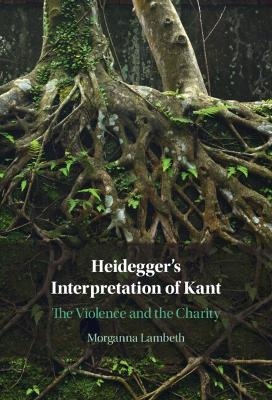
Heidegger's Interpretation of Kant
The Violence and the Charity
Seiten
2023
Cambridge University Press (Verlag)
978-1-009-23925-7 (ISBN)
Cambridge University Press (Verlag)
978-1-009-23925-7 (ISBN)
Heidegger has a reputation for reading himself into the philosophers he interprets, and his interpretation of Kant has therefore had little uptake in anglophone Kant scholarship. This book provides a new and compelling account of Heidegger's method of interpreting Kant, arguing that it is more promising than is typically recognized.
Heidegger has a reputation for reading himself into the philosophers he interprets, and his interpretation of Kant has therefore had little uptake in anglophone Kant scholarship. In this book, Morganna Lambeth provides a new account of Heidegger's method of interpreting Kant, arguing that it is more promising than is typically recognized. On her account, Heidegger thinks that Kant's greatest insights are located in moments of tension, where Kant struggles to articulate something new about his subject-matter. The role of the interpreter, then, is to disentangle competing strands of argument, and to determine which strand is most compelling. Lambeth traces Heidegger's interpretive method across his reading of Kant's Critique of Pure Reason and situates Heidegger's reconstruction of Kant's best line of argument against other post-Kantian readings. She finally shows how Heidegger's deep engagement with Kant sheds light on Heidegger's own philosophical views.
Heidegger has a reputation for reading himself into the philosophers he interprets, and his interpretation of Kant has therefore had little uptake in anglophone Kant scholarship. In this book, Morganna Lambeth provides a new account of Heidegger's method of interpreting Kant, arguing that it is more promising than is typically recognized. On her account, Heidegger thinks that Kant's greatest insights are located in moments of tension, where Kant struggles to articulate something new about his subject-matter. The role of the interpreter, then, is to disentangle competing strands of argument, and to determine which strand is most compelling. Lambeth traces Heidegger's interpretive method across his reading of Kant's Critique of Pure Reason and situates Heidegger's reconstruction of Kant's best line of argument against other post-Kantian readings. She finally shows how Heidegger's deep engagement with Kant sheds light on Heidegger's own philosophical views.
Morganna Lambeth is Assistant Teaching Professor in the Cornerstone Program for Liberal Arts, and Affiliated Faculty in the Department of Philosophy, Purdue University. Her research has appeared in The Cambridge Heidegger Lexicon (Cambridge 2021), History of Philosophy Quarterly, Inquiry, Journal of Aesthetics and Art Criticism and Kant Yearbook.
Introduction; 1. The Two-Strand Method of Interpreting Kant; 2. The Receptivity and Spontaneity of Cognition; 3. A Common Root: Heidegger's Foundationalism; 4. The Metaphysical Deduction and Schematism; 5. The Transcendental Deduction; 6. The Form of Time and Self-Affection; Conclusion.
| Erscheinungsdatum | 06.06.2023 |
|---|---|
| Zusatzinfo | Worked examples or Exercises |
| Verlagsort | Cambridge |
| Sprache | englisch |
| Maße | 152 x 229 mm |
| Gewicht | 488 g |
| Themenwelt | Geisteswissenschaften ► Philosophie ► Geschichte der Philosophie |
| Geisteswissenschaften ► Philosophie ► Philosophie der Neuzeit | |
| ISBN-10 | 1-009-23925-2 / 1009239252 |
| ISBN-13 | 978-1-009-23925-7 / 9781009239257 |
| Zustand | Neuware |
| Informationen gemäß Produktsicherheitsverordnung (GPSR) | |
| Haben Sie eine Frage zum Produkt? |
Mehr entdecken
aus dem Bereich
aus dem Bereich
die kolonialen Wurzeln der französischen Theorie
Buch | Hardcover (2024)
Matthes & Seitz Berlin (Verlag)
CHF 41,90
eine Geschichte der Zuversicht von Homer bis zum Klimawandel
Buch | Hardcover (2024)
C.H.Beck (Verlag)
CHF 39,20


